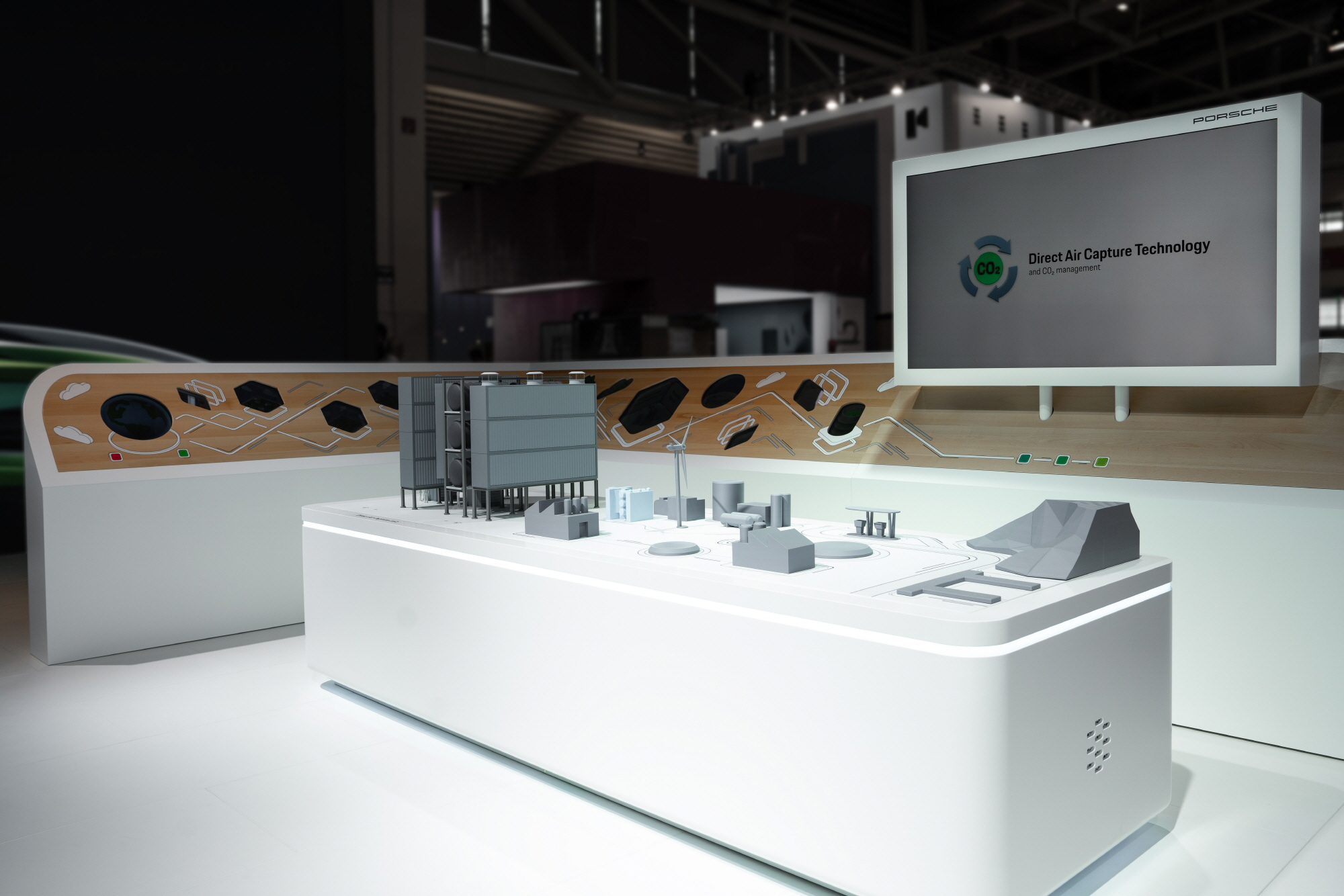
Porsche is viewing direct air capture technology as a promising means to extract carbon dioxide (CO2) from the atmosphere in an eco-friendly manner, as part of its climate change response strategy and innovative approach to mass production. Porsche is considering integrating DAC facilities at an eFuel pilot plant in Chile, in cooperation with Volkswagen Group Innovation, eFuel company HIF Global, and MAN Energy Solutions. This facility will be used to extract CO2 necessary for eFuel production from the air. Detailed operations of the DAC technology that aligns with Porsche’s strategy will be showcased at IAA Mobility 2023 held at the Munich Trade Fair Center.
Porsche has announced its initiative to develop ‘direct air capture’ technology to extract CO2 from the atmosphere, aiming for effective production processes in response to climate change.
Michael Steiner, Member of the Board of R&D at Porsche AG, stated, “To slow down global warming, it is essential to remove CO2 from the air and reduce emissions. At the same time, CO2 is the main raw material needed in many of Porsche’s production processes.” He further revealed, “We plan to apply DAC technology, meeting these two conditions, to vehicle production, and we are reviewing the integration of a DAC pilot facility at the eFuel plant in Chile with the skilled team of Volkswagen Group Innovation, eFuel partner HIF Global, and MAN Energy Solutions.”
He also emphasized, “DAC is a feasible and realistic technology for the future because it can extract carbon molecules needed for the production of various products in a sustainable manner.”
Barbara Frankel, Member of the Board responsible for procurement at Porsche AG, stated, “DAC is a crucial future technology for responding to the climate crisis and for energy extraction.” He added, “Pure CO2 can be used in industrial processes or permanently stored underground, and can also be utilized for eFuel production,” emphasizing that “eFuel will become a valuable means to complement e-mobility for internal combustion engine vehicles, which will remain on the roads worldwide for decades to come.”
The biggest advantage of DAC technology is that it can extract CO2 anywhere using renewable energy. The technology is also scalable. The electricity for the filter system at the daily Ooni eFuel pilot plant is generated from renewable energy, specifically wind energy, and the required heat is supplied from the hydrogen generation process of the eFuel factory.
Porsche collaborates with Volkswagen Group Innovation, HIF Global, and MAN Energy Solutions. Nicolai Adi, Director of Volkswagen Group Innovation, mentioned, “Since 2019, the Volkswagen Group has recognized climate change and CO2 extraction from the atmosphere as future tasks and has extensively studied suitable technologies and economic feasibility with research and industry partners. Through this, we have confirmed the scalability and commercial competitiveness of DAC technology.” He added, “Porsche plans to build a prototype plant with other partners to test this concept and looks forward to realizing such future-oriented projects in Chile.”
César Norton, the President and CEO of HIF Global, stated, “We are seeking proactive solutions rather than passive responses for sustainability and have proven that carbon-neutral eFuel can be a tangible solution for reducing carbon emissions in transportation.” He further expressed that “this collaboration with Porsche will provide an opportunity to lead in efficient and economical DAC technology.”
To extract CO2 from the air, surrounding air is first refined in large particle forms and passed through filter materials such as gravel. The extracted CO2 is later collected in a highly purified form for use as raw material, while the potential byproduct, water, is discharged.
The carbon dioxide extracted from the atmosphere is utilized in various ways as part of a circular economy. It can be used as a raw material for non-fossil-based plastics, allowing for long-term storage of CO2. It can also be utilized to produce synthetic fuels, known as eFuel. Porsche and HIF Global are researching the efficient usability of CO2 extracted through DAC technology at the daily Ooni eFuel plant located in Punta Arenas, Chile.
At the daily Ooni plant, CO2 combines with hydrogen to produce synthetic methanol, which is then converted into eFuel. Until now, Ooni has utilized biogenic resources and employed a carbon capture and storage (CCS) method to permanently remove CO2 from the atmosphere.
In December 2022, HIF Global, in which Porsche invested, began producing synthetic fuels at the daily Ooni pilot plant in Punta Arenas, Chile. The synthetic fuel is made from renewable energy, CO2, and hydrogen extracted from water, realizing carbon neutrality for internal combustion engine vehicles.
Porsche plans to produce approximately 130,000 liters of eFuel annually at the pilot phase and will initially use the fuel through ‘lighthouse projects’ such as Porsche Mobil 1 Supercup and the Porsche Experience Center. Subsequently, a large plant is planned to be built near the Chilean pilot plant to expand the production scale of eFuel.
Southern Chile provides ideal climate conditions for eFuel production. Strong winds blow for about 270 days a year, allowing wind turbines to operate at full capacity. Additionally, located near the Magellan Strait, Punta Arenas allows for the global transportation of synthetic eFuel while also utilizing existing infrastructure for distribution.
This synthetic fuel reasonably complements electrification. Porsche has already invested over $100 million in the development and production of eFuel. In April 2022, the company invested $75 million in HIF Global LLC, which plans, builds, and operates eFuel plants in Chile, the USA, and Australia.

Lee Sang-jin daedusj@autodiary.kr

